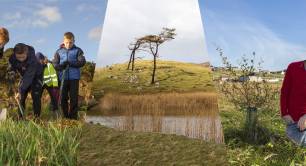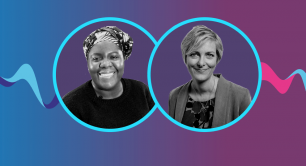Fit for the Future: How two high-growth startups harnessed ‘the power of tech’ for good
What does it mean to build a healthy, resilient, sustainable organisation that’s able to do good and well at the same time? Previously, we've discussed how to find the right finance, how to navigate risk, and how to look after your team in challenging times.
In this episode, co-hosts Tim West and Eddie Finch talk to Ariana Alexander-Sefre, founder and co-CEO of SE100 award-winning Spoke World, and Joe Seddon, founder and CEO of Zero Gravity and winner of the SE100 Leadership award, about the steps required to build a high-growth social business startup
Listen now:
Love podcasts? Don't miss out on ours! Catch up on all our podcasts and subscribe free on Apple Podcasts, Spotify or Soundcloud.
 How do you build a high-growth startup? In this episode of the Fit for the Future podcast, produced in partnership with Buzzacott accountants, we delve into how to take a startup to the next level at a fast pace, drawing from the journeys of two relatively young, high-growth social businesses.
How do you build a high-growth startup? In this episode of the Fit for the Future podcast, produced in partnership with Buzzacott accountants, we delve into how to take a startup to the next level at a fast pace, drawing from the journeys of two relatively young, high-growth social businesses.
The first is Spoke World, a social enterprise with an app that incorporates mental wellness tools into music and spoken word to help users care for their mental health better. Their aim is to use their app and live events to make “taking care of your mental health as easy as listening to your favourite music”, particularly for young men and people from diverse cultural backgrounds. Earlier this year, the business won the 2023 SE100 Trailblazing Newcomer award.
- Explore the SE100 Index and Social Business Awards, which celebrate the UK's most impressive social enterprises
Their founder and co-CEO, Ariana Alexander-Sefre, explained that she recognised the need for the innovative wellness app after losing a few people around her to suicide within just one year, all of whom were young men. She said: “I suddenly became very hyper aware of this epidemic that we’re living in. There is a male mental health epidemic, but actually youth mental health in general has gotten worse and worse over the past 25 years or so.” This, she says, is why she started Spoke World.
If you’re not a business serving a social, environmental or some kind of purpose that does good, then I don’t really know what you’re doing
“I believe very strongly that if you’re not a business serving a social, environmental or some kind of purpose that does good, then I don’t really know what you’re doing,” she added.
But why set up Spoke World as a social purpose business instead of a mental health charity? She responded: “I see the big players that have global mass momentum are able to connect with millions and billions of people worldwide. I don’t think we could grow that big and that fast unless we were a social enterprise rather than a charity.”
Also echoing the desire to grow a business instead of a charity was Joe Seddon, founder and CEO of Zero Gravity, a social enterprise with a digital platform that helps bright young people from low-income backgrounds get into top universities and good careers, and also develop useful skills.
This year, Seddon won the SE100 Leadership award for how he scaled the business impressively and “led from the front”, and Zero Gravity was highly commended in the SE100 Trailblazing Newcomer category.
Emphasising that a business model allowed for scaling in ways that a charity doesn’t, he said: “I never wanted to run a charity. I always wanted to run a business because I was a passionate believer that [while] social mobility [is] clearly an issue about social justice and equality, it’s also one of talent and productivity. And I thought if I can get this business to scale, there is a very clear commercial model that can make it work.”
In this riveting episode, Alexander-Sefre and Seddon, two young, ambitious leaders, share how they nurtured their visions of solving “social challenges” into award-winning, fast-growing startups by harnessing “the power of technology”, building a “product heavy team” of software engineers, networking and, of course, a lot of determination.
Thanks for reading our stories. As an entrepreneur or investor yourself, you'll know that producing quality work doesn't come free. We rely on our subscribers to sustain our journalism – so if you think it's worth having an independent, specialist media platform that covers social enterprise stories, please consider subscribing. You'll also be buying social: Pioneers Post is a social enterprise itself, reinvesting all our profits into helping you do good business, better.



